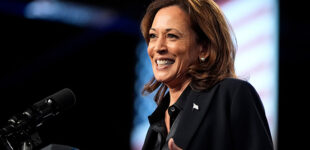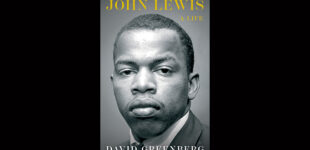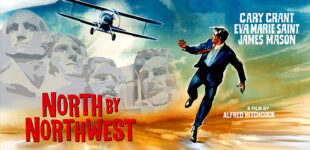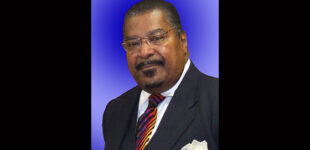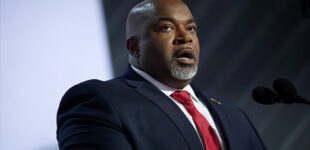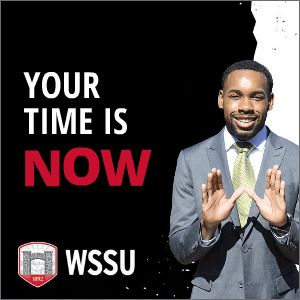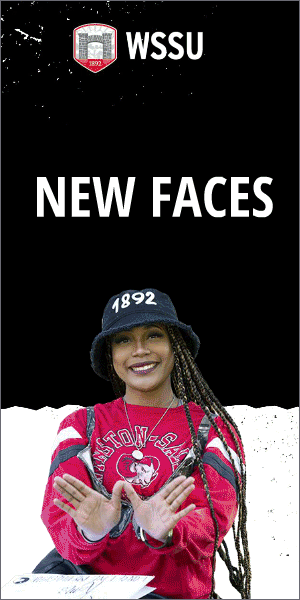Complicated Past, Present and Future
Panel tackles Palestinian/Israeli conflict
(pictured above: Imam Khalid Griggs speaks as Rabbi Dr. Andrew Ettin listens.)
A panel of professors and clergy gave their takes on the reasons behind the decades-old conflict between Palestinians and Israelis on Thursday, Oct. 2 at Wake Forest University.
Divisive issues were tackled, including whether Israel has committed war crimes and if a two state solution – or any solution – is possible to quell the conflict.
Moderator Dr. Michaelle Browers, Wake’s co-director of Middle East and South Asia Studies, directed a panel of WFU educators and experts – Co-Director of Jewish Studies Dr. Dean Franco; Assistant Professor of Religion Dr. Annalise Glauz-Todrank; Middle East and South Asia Studies Co-director Dr. Charles Kennedy; Temple Israel Rabbi and professor emeritus Dr. Andrew Ettin; and Community Mosque Imam and WFU Assistant Chaplain Khalid Griggs.
“The role of suffering is essential to each group’s conception of its own identity, and its because these two narratives of suffering cannot be reconciled that the conflict persists,” said Glauz-Todrank.
Panelists said the conflict can be traced back to tensions that arose between Jewish settlers and Arab natives of British-ruled Palestine in the early 20th Century. The Jewish population grew greatly as Jews fled Europe during World War II. Great Britain’s rule of the area expired in 1948, and the then newly-created United Nations was charged with deciding what to do with Palestine. The country was split in two, creating separate countries for Arabs and Jews. A Jewish/Arab civil war broke out, which led to a war between the newly-formed country of Israel and neighboring Arab countries. Through that war, and later ones, Israel gained more and more control of Palestinian territory, which has been a source of contention for generations now.
Most recently, the tension resulted in 50 days of warfare, missile strikes mostly, that ended in late August. The conflict killed approximately 2,200 Palestinians, mostly civilians, in the Gaza Strip, which is controlled by the Palestinian Islamic group Hamas. Israel lost 66 soldiers, and, although more than 5,000 rockets were fired into Israel, only five civilians died. Kennedy, who has been teaching a course on the conflict for 35 years, said the fight is asymmetrical, with no hope that Hamas-controlled Gaza can defeat Israel.
“They’re designed to be provocative,” he said about Gaza’s attacks. “They’re designed to get Israel to do exactly what Israel did, which is to disproportionately respond to this.”
He called Gaza’s attack a form of “civil disobedience” against Israel, which occupied Gaza up until 2005. Israel still controls Gaza’s borders and uses a blockade to restrict goods and access. Israel maintains that the blockade is needed to limit Hamas’ rocket attacks and its ability to get weapons.
“The Palestinians are on what you might say is diplomatic high ground,” Kennedy said. “Israel is put in a position where they cannot defend their actions in an international forum.”
In July, 29 of the 47 members of the UN Human Rights Council voted to investigate alleged human rights violations by Israel during the latest conflict. Seventeen countries abstained. The United States was the only “no” vote. Kennedy said Israel is becoming increasingly isolated in the world because of its actions.
Rabbi Ettin and Imam Griggs disagreed about the UN’s treatment of Israel. Ettin said Israel is wary of the Arab influence in the UN and feels it is being singled out for unfair scrutiny. Griggs said there have been excesses by Israel that the world is taking note of, citing South African Bishop Desmond Tutu, who earlier this year compared Israel’s treatment of Palestinians to Apartheid.
Though Ettin doesn’t always agree with Griggs, he calls him his “brother.” The two have been good friends for the last 35 years and share a hope that peace will eventually come to the region.
“Around the world, there are Jews and Muslims and Palestinians and Israelis who have had contact with each other that is not poison, that’s not poisonous,” said Ettin. “And they have learned much through that process.”
Kennedy said only a two state solution would bring peace, with Israel giving up territory to allow Palestine to become an independent country. He said leaders on both sides are unwilling to endorse such a plan, especially with Israeli settlers now settled in disputed territories.
Other panelists saw hope, though not with Gaza and Israeli leaders. They cited grassroots campaigns like the BDS Movement, which calls for Boycotts, Divestment and Sanctions to force Israel to change its policy.
“I think everything (Kennedy) said is terribly real, but there is this other reality too,” said Franco.
There is some dissent against Hamas, which many have labeled a terrorist organization, among some Muslims. Griggs said that conversation is one that Muslims in the United States are hesitant to have because the Muslim community has closed ranks since the scrutiny and monitoring they have endured since the Sept. 11, 2001 terrorists attacks.
“In the American Muslim community, there’s not the freedom of public discourse that many non-Muslims may have at this particular time,” said Griggs.
Dina Shehata, an international studies master’s degree student at N.C. State University, was among the attendees drawn to the forum by its topic.
“It’s very sad, especially with the recent happenings in Gaza, seeing the children and mothers and innocent civilians dying; it’s terrible,” she said.
Shehata, an Egyptian native who hopes to someday work at the UN, said she appreciated the hope some of the panelists offered.
“I’m hoping for a peaceful solution in the near future,” she said.



